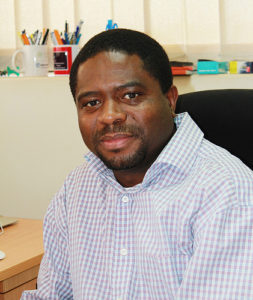

Advancing the march towards a food secure Africa: The role of biosciences and the BecA-ILRI Hub
February 8, 2015
An innovative approach to empowering agricultural scientists in applying modern biotechnology is helping Africa’s scientists and research institutions become globally significant players in agricultural technology innovations.
A leading African agricultural scientist is visiting Australia this week (Brisbane and Canberra) to discuss the latest scientific developments achieved through partnerships with and support from Australian institutions and private sector partners.

‘Africa is at the stage of agricultural development that was experienced by China and India back in the 1980’s and we have their lessons to hasten our development,” says Dr Appolinaire Djikeng, director of the BecA-ILRI Hub.
‘Our commitment is to support African scientists national agricultural research systems in responding to the food security needs of the region’ says Dr Djikeng.
The Biosciences eastern and central Africa Hub, hosted by the International Livestock Research Institute (BecA-ILRI Hub) in Nairobi, Kenya, stays on the cutting edge of advanced high-tech biosciences by establishing partnerships with advanced research institutes across the globe, including with Australia’s CSIRO, which facilitates exchange visits of scientists and research technicians to and from Africa.
Dr Djikeng explained that a critically important Australian Government funded partnership between the BecA-ILRI Hub and Australia’s national science agency, CSIRO, has made several discoveries that are being applied by agricultural scientists in Africa, for example, to breed maize varieties that resist the accumulation of aflatoxins that threaten the health of Africa’s maize consumers, improve the production of protein rich cavies (guinea pigs) and to improve programs controlling the spread of African swine fever, an economically devastating disease of pigs on the continent.
‘The private sector is a significant partner in Africa, where even getting enough seed to farmers, let alone appropriate varieties, is challenging. We have private sector partnership to accelerate the delivery to farmers of innovations generated by biosciences research.’
‘In another related public-private partnership with Australia’s International Food Security Research Centre (AIFSRC) of the Australian International Agricultural Research Centre (ACIAR) and the Crawford Fund, we will help plant breeders reduce the cost of producing preferred improved crop varieties for smallholder farmers that meet market demands,’ explains Dr Djikeng.
‘Africa’s food security depends on the continent’s capacity to efficiently use every resource available, including its rich human resource of scientists,’ says Djikeng.
‘With the support of Australia and other partners, the BecA-ILRI Hub is helping Africa lay a strong technological and scientific human resource foundation,’ he said
About the BecA-ILRI Hub
The Biosciences eastern and central Africa-International Livestock Research Institute (BecA-ILRI) Hub is a world-class agricultural research and biosciences facility located within and managed by ILRI in Nairobi, Kenya. It supports African and international scientists conducting research on African agricultural challenges and acts as a focal point for learning, interaction and strategic research — facilitating collaborations that benefit African farmers and markets within the region. The Hub was established as part of an African Union/New Partnership for Africa’s Development (NEPAD) African Biosciences Initiative, which employs modern biotechnology to improve agriculture, livelihoods and food security in eastern and central Africa.
https://hub.africabiosciences.org/
About ILRI
The International Livestock Research Institute (ILRI) works with partners worldwide to enhance the roles that livestock play in food security and poverty alleviation, principally in Africa and Asia. The outcomes of these research partnerships help people in developing countries keep their farm animals alive and productive, increase and sustain their livestock and farm productivity, find profitable markets for their animal products, and reduce the risk of livestock-related diseases.
ILRI is a not-for-profit institution with a staff of more than 600 and, in 2014, an operating budget of about USD83 million. A member of the CGIAR Consortium working for a food-secure future, ILRI has its headquarters in Nairobi, Kenya, a principal campus in Addis Ababa, Ethiopia, and offices in other countries in East, West and Southern Africa and in South, Southeast and East Asia.
ILRI leads the CGIAR Research Program on Livestock and Fish, leads a component of a CGIAR Research Program on Agriculture for Nutrition and Health on the prevention and control of agriculture-associated diseases, and contributes to six other CGIAR research programs. Staff members work in integrated sciences and biosciences programs that develop and deliver science-based practices, provide scientific evidence for decision-making and develop capacities of livestock-sector stakeholders.
https://www.ilri.org
Dr Appolinaire Djikeng will be in Canberra and Brisbane from 9–12 February 2015 and will be available for interview. For further information and interviews, contact Cathy Reade, Director of Public Affairs and Communication at the Crawford Fund 0413575934




